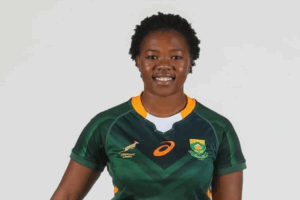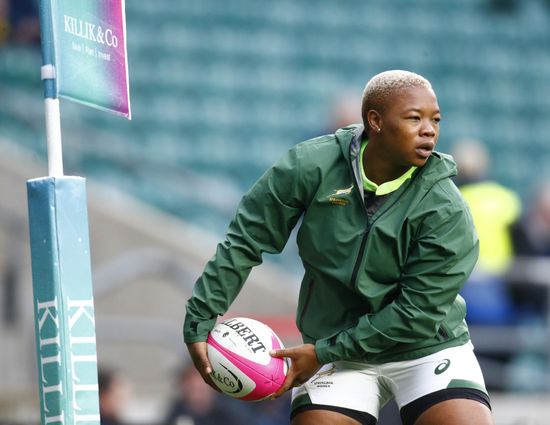Our latest student story features Lindelwa Gwala, a player for both the South African Rugby Union Women’s Team and the Earling Trailfinders Rugby Club.
Lindelwa shared her journey from her introduction to rugby to representing her country and breaking records to become the most-capped Springbok Women hooker.
From An Unlikely Beginning to Springboks Call-Up
Lindelwa’s love for the game and hard work eventually led her to where she is today. “Playing the sport professionally always seemed like something very far from me considering that it was not professional for many years in my country. I have always been a hard worker, and somehow things aligned so that I could be where I am today,” she shared.
For Lindelwa there is one key moment that stands out amongst the rest. “My standout moment was when I got my first national call-up. My teammate called me to say that I should check my emails and there it was, 5 more players had been invited to the national camp and I was one of them. I can still feel the emotions when I think about it.”
Representing her country and community is something she is immensely proud of. “Being able to represent my country is a great honour, it’s one of those things that are really hard to describe but I know I want to do it to the best of my capabilities. I believe I’m not just representing my country but I’m representing the community that I come from, I’m representing my friends and my family, they celebrate me the most. They are what has made my journey even more meaningful,” she shared.
Balancing Preparation and Performance
 A typical week for Lindelwa includes three training days and dedicated time for mental preparation ahead of match days. “In a week we had 3 days of training. If we have a game on the weekend, I would normally use my Friday to mentally prepare for that—goal setting, visualising, internal check-in,” she explained.
A typical week for Lindelwa includes three training days and dedicated time for mental preparation ahead of match days. “In a week we had 3 days of training. If we have a game on the weekend, I would normally use my Friday to mentally prepare for that—goal setting, visualising, internal check-in,” she explained.
While transitioning between club and international rugby doesn’t require any major tactical adjustments, the mental demands of the game intensify at the international level. “There isn’t too much adapting to do, rugby is all the same with different calls,” she said. “Going into a national camp I just make sure that I am mentally ready because the level of intensity is on another level.”
Having played both at home and abroad, Lindelwa has noticed some differences in rugby culture and playing style between South Africa and England. “Playing-wise, I think with the SA side we are not a team that will shy away from physicality, while in England they like the ball to do more of the work,” she said.
Studying with Setanta College
Lindelwa’s introduction to strength and conditioning came about when she received her call-up to the national team. “I have always felt like my strength and conditioning journey only started when I got into the national team. Prior to that, I was just playing rugby without a clue in the world that I had to condition myself. Injuries were a common thing for me and I always think that not having that information was so unnecessary,” she said.
Driven by her own experience of the impact of S&C, Lindelwa was motivated to enrol in the BSc in Strength & Conditioning to help other athletes enhance their performance. “I would like to help in youth development, I want to be able to help young athletes optimise their abilities and just to have the information on how to do that as they develop,” she shared.
The knowledge gained through her studies has positively influenced her own training and performance. “I’m more intentional about a lot of things and I’m aware of the things that can help me get better. I think it has also made me more physically aware of myself and know when to proceed with caution. I always think that I could still do better though with all the information I have,” she said.
The Future of Women’s Rugby
Women’s rugby has seen significant growth in recent years but there is still progress to be made. Having been a part of the Springboks since 2018 Lindelwa has seen some positive changes in inclusivity and is hopeful for more progress going forward. “I just attended the Springbok awards dinner recently and that was the first dinner where we had the whole women’s squad invited. It seems like something so small but that inclusion feels special for me and I’m hopeful for the future of women’s rugby, especially in South Africa.
A lot of things have been put in place so we can get better. In the past, I would have been screaming that the rugby unions can do better, and while they can still do better, I’m witnessing some great things and I am appreciative of the effort,” she noted.

Looking Ahead
As she nears the end of her studies Lindelwa’s main focus is on the 2025 Women’s Rugby World Cup. “My only focus now will be preparing for the Rugby World Cup while I figure out what it is I want to do next,” she shared.
While she remains undecided about her next career steps, Lindelwa is excited about the future and the possibilities that are open to her. “I’ve always loved the idea of youth athletic development, as of recently I have been thinking about considering going the forwards coach route and there is also sport psychology. Honestly, I have no clear plan yet, but I’m excited about the possibilities, and I have to admit that it’s kind of scary,” she said.

